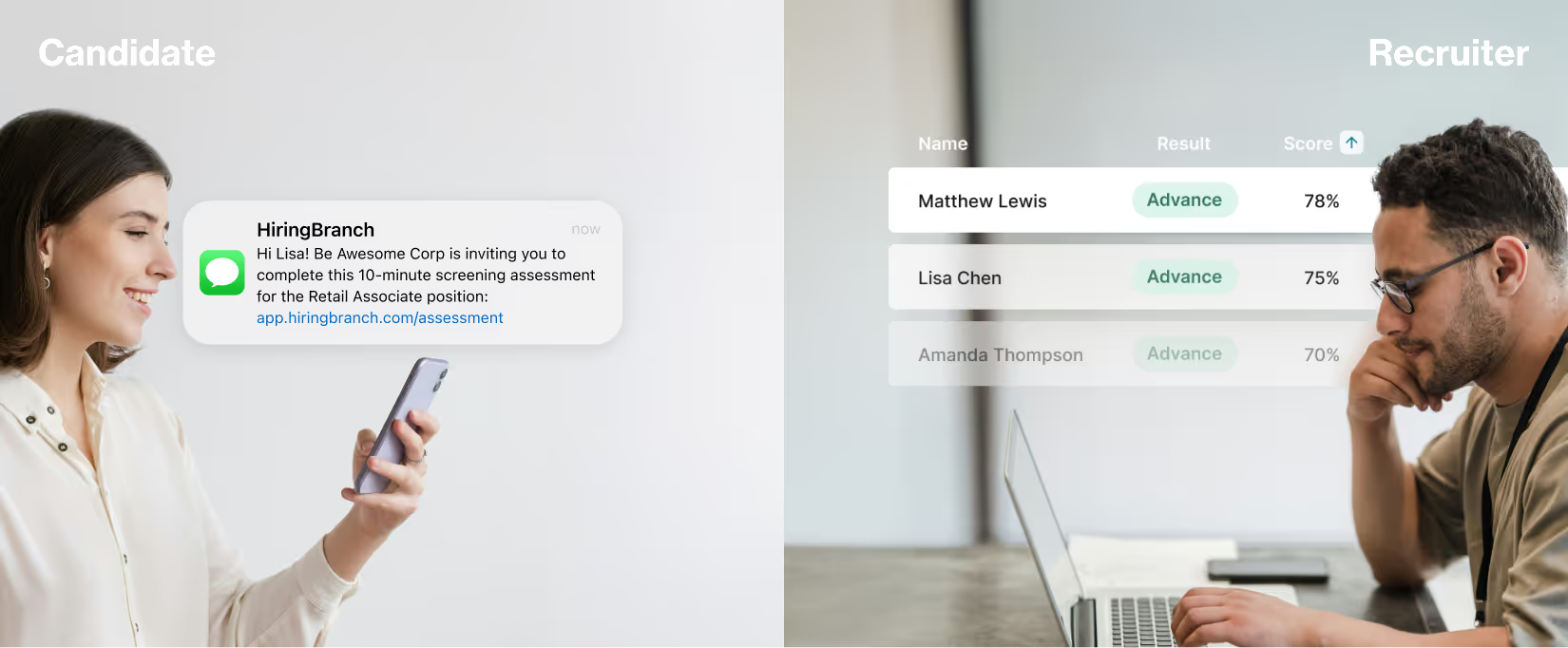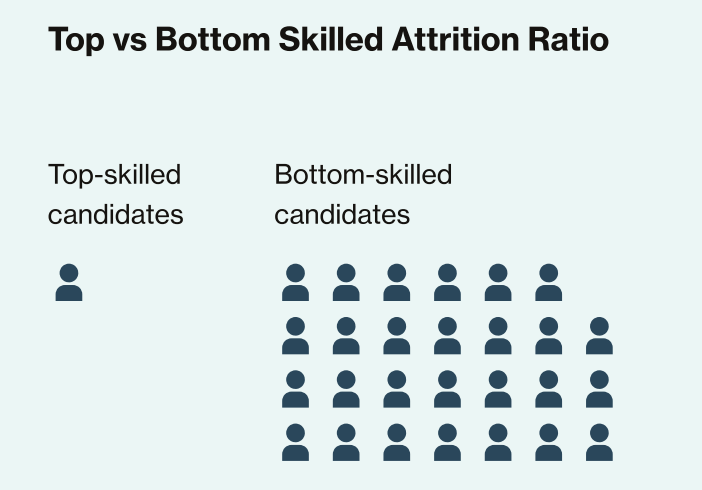
Frontline employees are an essential part of day-to-day life. From grocery store clerks to cashiers, call center agents, and many more - frontline employees contribute through numerous industries and professions. Whether or not they get the glory they deserve in their role is another question.
This guide is meant to shed light on the under-appreciated frontline employee, and let employers know how they can set them up for success in the workplace. In the following paragraphs, employers will find information about how to recruit, train, manage, and support frontline employees.
What is a Frontline Employee?
Frontline employees are the people within your company whose role requires them to work directly with customers. They are the first point of connection for customers on behalf of your company.
All frontline employees interact with the public, although some remotely, including customer care agents, healthcare providers, teachers, public transit operators, store clerks, and more. They are often from industries like grocery, retail, hospitality, health care, call centers, and more.
The nature of frontline work necessitates that these employees have to be ready for whatever person they’re dealing with that day, involving a certain level of soft skills. Frontline employees give a human face to your institution and embody the values and core beliefs that define your brand or mission.
In the retail, telco, and food sectors, physical closures during the pandemic pushed consumers online and placed a heavier burden on call center employees to be the sole face of the brand. Agents found themselves representing their company in unprecedented ways during the lockdown. Since the pandemic frontline workers have been harder to find.
Frontline Employees and The Modern Marketplace
Frontline workers represent an estimated 80% of the global workforce, and forward-thinking companies are already investing in both technology and the people who bring their company’s vision to life.
The pandemic brought to light the importance of properly identifying and protecting workers on the frontlines. Industries had to invest in establishing protocols for their public-facing employees; however, employers have struggled to regain the workforce they once had ever since.
Within the hospitality and food industries, turnover has been more than twice the national average due to low wages, unpredictable hours, poor customer behaviour, and more. Unfortunately, the lack of staff puts additional strain on existing employees who have to work overtime more often than they’d like to compensate. Restaurants are having to close when staff can’t fill in the gaps, and in the US that equates to an average of 10–25% of gross revenue per store.
There’s a case to be made for investing in attracting, hiring, and treating frontline employees better. How can employers do a better job? And what role will these workers play in an increasingly digitized future?
“If hard or technical skills reflect what an employee does, then a soft, or non-technical, skill reflects how they do it.”
If hard or technical skills reflect what an employee does, then a soft, or non-technical, skill reflects how they do it. The modern workplace is hybrid and one where soft skills can’t be replicated by technology. Technical skills, like learning a new piece of software, are easily taught while soft skills tend to be more innate. So it makes sense to hire for soft skills, using technology like pre-hire assessments, and to train for technical skills.
Hiring Frontline Employees
Recruitment and retention are among the two biggest challenges companies face when hiring for the frontline. It’s increasingly difficult to source candidates, and the remaining staff working on the frontlines are often overworked and overlooked.
Zooming in on recruitment, hiring teams say that finding high-quality candidates and delays in the hiring process are the biggest challenges affecting their organization’s hiring goals.

With this in mind, imagine how many delays are created sifting through resumes and conducting wave after wave of interviews, only to reveal low-quality candidates. There are hundreds of HR tech vendors that can help hiring teams save time during the hiring process but beware of the wrong system that promises more time but still leads to low candidates. Consider the following from one of our recent blog posts:
“Most technology systems dedicated to hiring focus on one or two pre-hire metrics, like time-to-hire, but ignore what happens post-hire. For example, a technology tool seldom reassures hiring teams that if they use their tool they can expect customer satisfaction to increase or sales to be better. They can only tell you that you can make decisions quicker. In reality, this may create more delays if you’re not making the right decisions in the first place. The cost of a bad hire is estimated as high as 27 weeks of wasted time and 3.5x the position salary. Multiplied many times over, bad hires can cost companies millions of dollars.”
Employers need to know that the systems they commit to and invest in are going to not only save them time but also help them improve their frontline workforce performance. Employers can’t afford to gamble on just any technology system, especially in high-volume hiring environments like call centers where the impacts take effect at scale.
Using pre-employment assessments that deploy AI technology to screen for the soft skills that a candidate will need on the job has shown promise. Recruiters can use these types of assessments to put recruits in real on-the-job situations to determine fit. The best pre-hire technology assessments should:
- “Operate seamlessly across digital platforms
- Operate across different regions and be available in many languages
- Be easy to integrate with your existing processes
- Measure language, communication, employability, and soft skills at once
- Be already in use by other companies
- Have proctoring built-in
- Not have one right answer to various questions
- Have the ability to be customized to the particular needs of a role or talent acquisition team
- Offer a proof of concept
- Measure new hire performance to correlate it back to the assessment results
- Be able to provide references”
Post-employment assessments are also a key piece of the puzzle for HR departments looking to streamline the hiring process. Existing employees can provide valuable insights into the places in the hiring process that need to be improved, the obstacles they faced during onboarding and training, and tips for how to better support new employees.
The Making of a Top Frontline Employee
Top-performing frontline employees share several key attributes that make them exceptional at what they do. For example, the top two soft skills for salespeople are building rapport and a high level of fluency. The top seven soft skills contact center agents should have are:
- Empathy
- Active listening
- Communication
- Positive attitude
- Friendly nature
- Ability to handle pressure
- Organization
Again, screening a candidate for the right soft skills from the start can improve hiring quality significantly. One fundraising call center implemented a soft skill assessment and saw pledges increase overall by 10%.
Technology isn’t foolproof though and some companies just can’t get the talent they would like. As we recently explained:
“At the end of the day, some just won’t be able to attract enough high-performing candidates to fill all the roles they’re hiring for. There could be a few reasons for that from problems in the hiring process like we discussed above, or even poor employer branding.”
Teams who aren’t getting the quality of candidates they need can always train them. Not just train them for the job, but train them for the skills they lack. For frontline employees, make sure to use scenario-based training that is relevant to the role and focus on the key soft skills the person is lacking for the role you’re hiring for. You can also benchmark trainees against top-performing employees.
How to Motivate Frontline Employees With Appreciation
Once a frontline employee is hired and trained, it’s important to keep them. Employees feel motivated when they are valued and appreciated. “When people feel valued and appreciated, they have more of a full emotional tank to deal with the problems and challenges that customers bring,” explains psychologist and author Dr. Paul White in reference to frontline employees. This is so important that in one decade-long study by the O.C. Tanner Institute analyzed more than 200,000 employees who quit their jobs, 79% did so because they didn’t feel appreciated.
Make sure precious frontline employees feel supported in their journey as new hires and have the resources they need to perform well. Then create a company culture that motivates them to do their best work in whatever that may look like for the industry and organization at hand.
Motivation through appreciation is not just a nicety, it’s part of how employers can invest and commit to their frontline employees. Unmotivated and disengaged employees are costly and can create:
- Higher rates of absenteeism
- Lower levels of customer satisfaction (reduced NPS, CSAT scores)
- Higher rates of attrition
- Increased operational costs
- Lower profits, and more.
Microsoft reports on what can help reduce stress and improve the job of frontline employees:

To foster an environment in which frontline employees can thrive, employers can increase vacation time, increase compensation, and improve technology. They can also work on scheduling, communication, benefits, and more.
In addition to the points above, employers should avoid putting pressure on employees and instead be supportive of their continuous learning journey. Employees should also have a purpose and understand the impact their contributions have on the customer experience and the organization’s goals overall. Finally, employers should make sure to provide recognition where it’s due. Recognition is one of the top drivers of workplace performance.
Frontline Employees Are Your Best Investment
There are several reasons why supporting frontline employees is a smart investment, including making them feel valued and lowering attrition as mentioned above. When employees feel valued they will perform better at work which can lead to increased customer satisfaction as well.
Studies have found that teams with employees “who score in the top 20% in engagement realize a 41% reduction in absenteeism, and 59% less turnover. Engaged employees show up daily with passion, purpose, presence, and energy.” Absenteeism and presenteeism cost Canadian employers $645 Million in 2022 Manulife reports, and therefore a reduction can have a significant impact on the bottom line. Companies that place employee wellness at the center of their core beliefs are better positioned to protect their most valuable asset, their human capital.
While valuing, engaging, and empowering people can sound like a nebulous concept, there are a few key actions employers can take to provide employees on the frontlines with better job satisfaction:

Growth
Provide opportunities for personal and professional growth. No one wants to feel like their talent is being wasted, or that they are not moving forward towards their goals. Implementing a data-driven process for benchmarking existing employees and assessing new hires means employers can track a framework of skills throughout the employee’s life cycle from pre-hire to associate. Employees want to work at a place where they can see a future.
Communication
Establish a policy of two-way feedback, so employees feel like their voice is heard and valued. Create a culture of transparency that encourages seamless communication between managers and employees to help everyone feel like they are part of the team.
Tools
Give employees the technology that will help them do their best work, like AI tools to help them automate repetitive tasks and improve their job performance. If KPIs are keeping pace with the latest advancements in the field, but the technology is not, employees may be set up to fail.
Recent Stats About Frontline Customer Service
A recent report from NICE revealed heaps of valuable and up-to-date statistics and information for employers who hire frontline workers. The following highlights can help provide even more clues specifically for frontline customer service workers to succeed:
Voice & Tone
- Complaints from customers arise when agents don’t empathize with their situation or make an effort to (Source: TransCosmos).
- Customers don’t like the use of scripted phrases such as “your call is very important to us” (Source: American Express).
- Rather than a formal tone, 65% of customers online preferred when agents used a casual tone. More importantly, the tone should match the situation (Source: Software Advice).
Experience
- Customers want to deal with one agent throughout their experience and their biggest complaint was “being passed around” as a primary complaint (Source: UK Mirror).
- Customers want one omnichannel customer service experience and don’t like having to move through various social media channels to get an answer from customer service (Source: eGain).
- Having to explain the same problem and confirm their identity multiple times to different agents is something customers hate (Source: TransCosmos).
- Customers want personalized service, including knowing their name and past engagement with the company (Source: TransCosmos).
- Almost half of customers will stop working with a company that frustrates them, but only 32% will make a complaint before moving their business (Source: The Drum).
When Things Go Wrong
- When customers are angry they want an apology, and getting one can increase their satisfaction by 100% (Source: Carey School of Business).
- When a company makes a mistake customers want to be compensated for it, like with a discount for example (Source: Carey School of Business).
Putting it all Together
Frontline employees work directly with customers, making them an essential part of the team. They put a human face on the companies they represent and demonstrate the values behind them through their service. Frontline workers may make the first or the final impression and therefore have the influence to establish or destroy customer loyalty. Employers need to recognize that and see frontline employees as the valuable investment they are.
Hiring the right people from the get-go makes all the difference. To do this employers need to know which soft skills they need for the frontline employees they need to hire. Then they can screen candidates for these during the hiring process. Employers can also train frontline employees on the skills they’re lacking to meet demands and also help employees feel supported.
Ensuring your frontline employees feel seen and valued in their roles is one of the best ways to improve their performance and bring your team closer to meeting your company goals. Make your company an amazing place to work, and don’t be stingy on employee recognition!
Image Credits
Feature Image: Unsplash/Lumensoft Technologies
Image 1: Via NICE
Image 2: Via Microsoft
Image 3: Image created by HiringBranch using data from HBR Analytic ServicesUpdated: December 15, 2023












































.jpg)

.jpg)



























.avif)




.avif)
.avif)



























.webp)





.svg)
